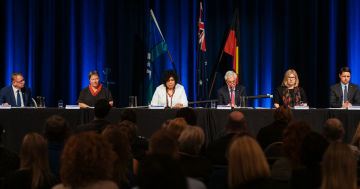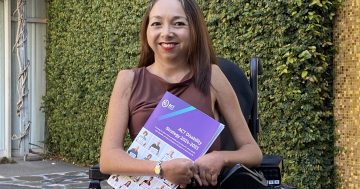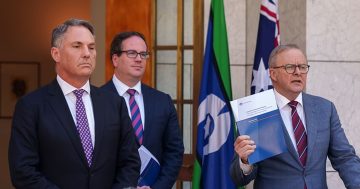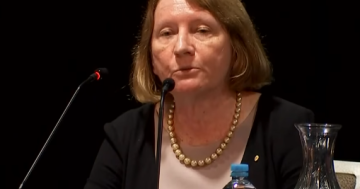
“The stories that people with disability told filled three full volumes of the disability royal commission final report, showing the scale of abuse against us,” read the NDRO statement. Photo: @DRC_AU Twitter.
The response from all levels of government to the Royal Commission into Violence, Abuse, Neglect and Exploitation of People with Disability has been met with scorn after only 13 of the 222 recommendations were fully accepted.
From 2019 to 2023, the royal commission worked to deliver its final report. Commissioners heard from people with disability, their families, supporters, kin, advocates and representative organisations about the harm people with disability had experienced in public, at school, work, hospital and prison, and from disability services.
National Disability Representative Organisations (NDRO), including the Australian Autism Alliance, Down Syndrome Australia and Inclusion Australia, have expressed significant concern that many of the recommendations remain unresolved since the report’s publication nine months ago.
“We call on all levels of government to urgently act on the 222 recommendations, including providing clear timelines within the next six months on all recommendations accepted in principle and embed disability leadership through establishing a Disability Reform Implementation Council,” the NDRO statement said.
“This should be led by a diverse group of people with disability and our representative organisations, ensuring we are setting the pace and directly engaged in the council’s outcomes.
“The royal commission made 222 recommendations across all levels of government, but also to schools, disability providers, health care, police, prisons, employers and more. This was a once-in-a-lifetime examination of the scale of violence so many people with disability experience and deserves and demands a response of the same scale.”
The core finding of the royal commission was that across all age groups, a greater proportion of people with disability experience violence and more frequently than those without disability. Women and culturally and linguistically diverse people with disability were found to have disproportionate experiences of violence.
Key recommendations from the royal commission on how to stop the violence lacked commitment or funding. They included national coordination, reform of disability service providers, changes to the law, and increased access to support and leadership of people with disability in making these changes.
NDRO also noted the large number of recommendations in the final report that directly impact First Nations people with disability, citing their implementation as crucial to adhering to the Closing the Gap agreement.
One other avenue NDRO supported for better legal protections was the recommendation to establish a federal human rights act. However, it was also not fully accepted.
The only praise it gave to the government’s response was in its commitment to reforming the disability discrimination act and a funding increase for advocacy organisations.

Royal commissioners Mr John Ryan AM, Dr Rhonda Galbally AC, Ms Andrea Mason OAM, chair Mr Ronald Sackville AO KC, Ms Barbara Bennett PSM and Dr Alastair McEwin AM. Photo: Screenshot.
Of the 129 recommendations relevant to the ACT, the Territory Government accepted 19 in full, 93 in principle, noted two and requires further consideration of 15 other recommendations. The ACT Government has not rejected any of the recommendations but is working closely with the Commonwealth and all states and territories on those requiring a national response.
Some work is already underway from $13.9 million in funding from the 2024-25 ACT Budget, including for implementation of the First Action Plan 2024-2026 of the ACT Disability Strategy 2024-2033.
Another $14.4 million was allocated in the budget review to commence implementation of the Inclusive Education: A Disability Inclusion Strategy for ACT Public Schools 2024-2034.
The budget is also helping establish a taskforce that will lead reforms in response to the royal commission and NDIS review.
ACT Chief Minister Andrew Barr said his government welcomed the report’s findings and was committed to implementing the recommendations.
“We are investing significant planning and funding towards initiatives that promote and protect the rights of people with disability in the ACT,” he said.
“Together with people with disability, we are working to create a safer, more accessible Canberra for everyone.”
ACT Minister for Disability Rachel Stephen-Smith noted the role of advocacy groups who made the royal commission possible and into a “powerful force for change”.
“The ACT Government has heard this important call to action,” Ms Stephen-Smith said.
“We will ensure your courage and generosity help shape generational reforms towards a safer, more inclusive and accessible Canberra.”
Original Article published by James Day on PS News.





















